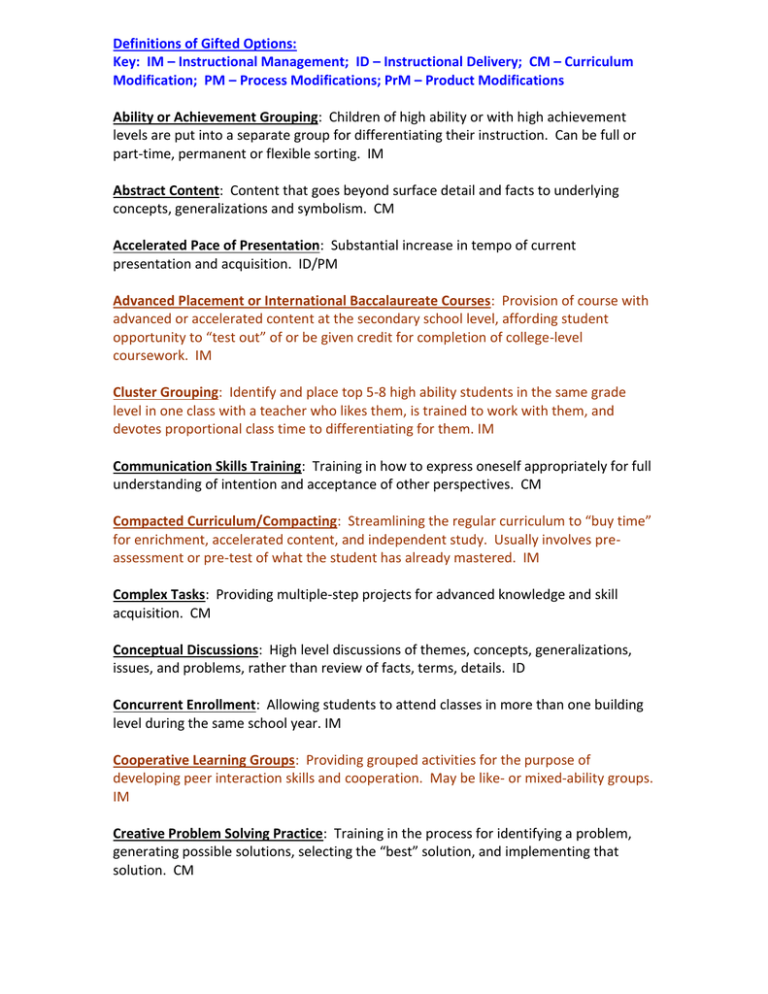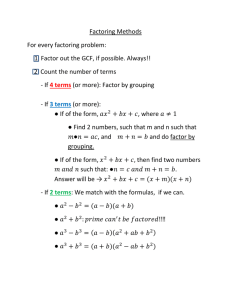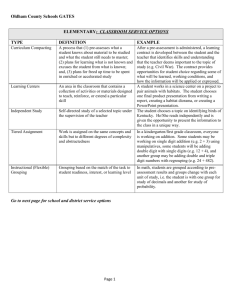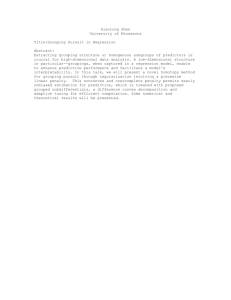Definitions of Gifted Options:
advertisement

Definitions of Gifted Options: Key: IM – Instructional Management; ID – Instructional Delivery; CM – Curriculum Modification; PM – Process Modifications; PrM – Product Modifications Ability or Achievement Grouping: Children of high ability or with high achievement levels are put into a separate group for differentiating their instruction. Can be full or part-time, permanent or flexible sorting. IM Abstract Content: Content that goes beyond surface detail and facts to underlying concepts, generalizations and symbolism. CM Accelerated Pace of Presentation: Substantial increase in tempo of current presentation and acquisition. ID/PM Advanced Placement or International Baccalaureate Courses: Provision of course with advanced or accelerated content at the secondary school level, affording student opportunity to “test out” of or be given credit for completion of college-level coursework. IM Cluster Grouping: Identify and place top 5-8 high ability students in the same grade level in one class with a teacher who likes them, is trained to work with them, and devotes proportional class time to differentiating for them. IM Communication Skills Training: Training in how to express oneself appropriately for full understanding of intention and acceptance of other perspectives. CM Compacted Curriculum/Compacting: Streamlining the regular curriculum to “buy time” for enrichment, accelerated content, and independent study. Usually involves preassessment or pre-test of what the student has already mastered. IM Complex Tasks: Providing multiple-step projects for advanced knowledge and skill acquisition. CM Conceptual Discussions: High level discussions of themes, concepts, generalizations, issues, and problems, rather than review of facts, terms, details. ID Concurrent Enrollment: Allowing students to attend classes in more than one building level during the same school year. IM Cooperative Learning Groups: Providing grouped activities for the purpose of developing peer interaction skills and cooperation. May be like- or mixed-ability groups. IM Creative Problem Solving Practice: Training in the process for identifying a problem, generating possible solutions, selecting the “best” solution, and implementing that solution. CM Creative Skills Training: Training and practice in various creative thinking skills, such as fluency, flexibility, elaborations, risk-taking, SCAMPER, synectics, morphologies, analogies, and imagination. CM Credit by Examination: Provision of testing programs whereby the student, after successful completion of a test, will be offered a specified number of course credits. The College Level Examinations Program (CLEP) is the program widely used at the university level. IM Credit for Prior Learning: Allowing students to demonstrate mastery of previously learned material through some form of assessment; same as “testing out.” IM Critical Skills Training: Training in critical thinking skills, such as cause and effect, sorting of relevant data, induction, deductions, generalization, etc. CM Cross-Grade/Cross-Age Grouping: Grouping children by their achievement in a subject area rather than by grade or age level. Currently known as multi-age classrooms. IM Cultural Enrichment in the Arts: Providing knowledge and skills in art, music, theater, dance, creative writing, graphics, particularly the history, aesthetics, and criticism aspects of these art forms. CM Dilemmas, Conflict Resolution Tasks: Providing hypothetical and real ethical dilemmas and conflicts in behavior/intent for discussion, solution, simulation exercises, etc. CM Early Admission to College: Permitting a student to enter college as a full-time student without completion of a high school diploma. IM Early Content Mastery: Giving students access to knowledge and concepts in a content area considerably before expected grade- or age-level expectations CM Early Entrance to School: Allowing selected gifted children showing readiness to perform schoolwork to enter kindergarten or first grade 1-2 years earlier than the usual beginning age. IM Early Exposure to the Basics: Access to the basic knowledge and skills of the range of academic subject areas considerably before expected age or grade. CM Flexible Project Deadlines: Occasional renegotiation of when projects or assignments will be due, especially when high quality work has already been shown. ID?PM Flexible Tasks: Allowing students to structure their own projects and investigations according to their strengths and interests. ID/PrM Full-time Ability Grouping: Sorting students, usually once a year, by ability level and then scheduling all of their academic (some times nonacademic) classes together. IM Grade-Skipping: Double promoting a student such that he/she bypasses one or more grade levels. IM Grade Telescoping (“Rapid Progress”): Shortening the time of progressing through a school level, such as junior or senior high by one year, while still covering all curriculum. IM Group Skills Training: Training in how to work and communicate as a member of a group, either as leader or participant. CM Higher Order Thinking Skills: Questioning in discussions or providing activities based on processing that requires analysis, synthesis, and evaluation, or other critical thinking skills. PM Independent Study Projects: Structured projects agreed upon by student and supervising teacher that allow a student to individually investigate an area of high interest or to advance knowledge. IM Individual Education/Learning Plans (in PSD: Advanced Learning Plan): Provision of formal written plan for managing and delivering the curriculum for a child with extraordinary differences in ability or educational needs. IM Individualized “Benchmark” Setting: Working with an individual student to set performance outcomes for the student’s next product or performance. IM Intuitive Expression Practice: Providing tasks in which students put themselves “in the shoes of” another person, situation, object through guided imagery, role-playing, etc. PM Learning Contracts: Student and teacher jointly develop a contract for accomplishment of learning outcome(s); often involves a streamlining of regular class work. Like-Ability Cooperative Learning: Organizing groups of learners in three- to fourmember teams of like ability and adjusting the group task accordingly. IM Magnet School: Provision of a separated school focused on a specific subject area or areas (art, math, etc) or on a specific group of students (academically gifted or mathematically talented) with students gifted in that area. IM Mentoring: Establishment of one-to-one relationship between student and outside-ofschool expert in a specific topic area or career. IM Multi-Grade/Multi-Age Classes: Combining two or three grade levels into one classroom and placing the brightest children as the youngest children in the class. IM Non-Graded Classes: Placing learners in a classroom without regard to age or grade and allowing them to work through the materials at a pace and level appropriate to their individual ability and motivational levels. IM One-on-One Tutoring/Mentoring: Placing a gifted student with a personal instructor who will offer curriculum at the appropriate level and pace. IM Open-Ended Assignments: Providing students with tasks and work that do not have single right answers or outcomes. The task may have timelines and a sequence of activities to be accomplished, but outcomes will vary for each student. PrM Organizational Management Training: Training in how to break down projects and goals into manageable and sequential steps and to estimate the time needed to accomplish these steps. CM Partial Day/Send-Out Grouping: Removal of gifted children from a regular classroom for a specified period of time each day or week to work with trained specialist on differentiated curriculum. IM Peer-tutored Dyads: Students who have already mastered the curriculum working oneon-one with students who still need to master it. Planning Techniques: Training students in “backwards planning,” task analysis, flowcharting, etc. to break down projects and goals into intermediate, manageable sequences of time-related steps. CM Problem-Based Learning: Providing students with unstructured problems or situations for which they must discover the answers, solutions, concepts, or draw conclusions and generalizations. ID Problem-Solving Skills Training: Providing students with problem-solving strategies matched to differing problem types. PM Proof and Reasoning: Requiring students to cite their evidence to support ideas or concepts they generate. PM “Real Audience” Feedback: Using out-of-school experts to evaluate student work in a specialized area of study. PrM Real-Life/Real World Learning Experiences: Provision of tasks, projects that relate to current issues and problems in society or student’s own world. PrM Regrouping by Performance Level for Specific Subject Instruction: A form of grouping, usually sorted for once a year, that delivers appropriately differentiated curriculum to students at a specific ability or achievement level. IM School-within-a-School: Gifted students are placed in self-contained classes at every grade level in an otherwise heterogeneous school. IM Self-Concept Development: Provision of activities, discussion for the development of self-awareness, self-confidence, and improvement of self-esteem. CM Self-Direction Training: Training in autonomous learning skills, independent thinking, and personal goal setting. CM Service Learning Projects: Provision of academic credit for student volunteer work on community and welfare projects. CM Single-Subject Acceleration: Allowing students to move more quickly through the progression of skills and content mastery in one subject where great advancement or proficiency has been observed; other subjects may be at grade level. IM Social Issues Discussions: Provision of current events, political, philosophical, and social issues for discussion. CM Subject Integration/Thematic Approach: Uniting two or more disciplines and their content through a conceptual theme, such as “origins” or “change” or “friendship.” CM Systematic Feedback: Consistent, regular evaluations of student’s products, performance, knowledge acquisition for both corrective and reinforcement purposes. Talent/Ability Grouping: Grouping students of like ability or like interest on a regular basis during the school day for pursuit of advanced knowledge in a specific content area. IM Talent Development: Provision of experiences for an individual student with demonstrated high performance or potential in a specific area either through individual work or with a group of students with like talent. IM Telescoping of Learning Time: Any technique that shortens the amount of time a student is provided to acquire content and skills, i.e., rapid progress, acceleration, compacting, tempo; can be subject specific or across a grade level. IM Within-Class Ability/Performance Grouping: Sorting of students, topic-by-topic or subject-by-subject within one classroom for the provision of differentiated learning for each group.



